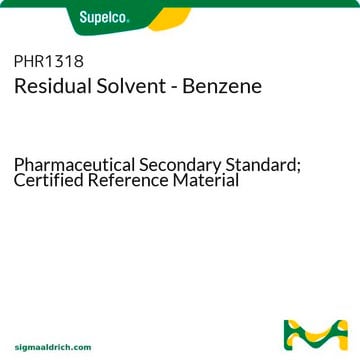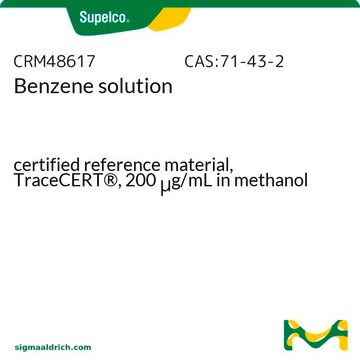PHR1310
Benzène
Pharmaceutical Secondary Standard; Certified Reference Material
About This Item
Produits recommandés
Qualité
certified reference material
pharmaceutical secondary standard
Niveau de qualité
Agence
traceable to NIST 3000
traceable to USP 1601146
Densité de vapeur
2.77 (vs air)
Pression de vapeur
166 mmHg ( 37.7 °C)
74.6 mmHg ( 20 °C)
CofA (certificat d'analyse)
current certificate can be downloaded
Température d'inflammation spontanée
1043 °F
Limite d'explosivité
8 %
Technique(s)
HPLC: suitable
gas chromatography (GC): suitable
Indice de réfraction
n20/D 1.501 (lit.)
Point d'ébullition
80 °C (lit.)
Pf
5.5 °C (lit.)
Densité
0.874 g/mL at 25 °C (lit.)
Application(s)
pharmaceutical (small molecule)
Format
neat
Température de stockage
2-30°C
Chaîne SMILES
c1ccccc1
InChI
1S/C6H6/c1-2-4-6-5-3-1/h1-6H
Clé InChI
UHOVQNZJYSORNB-UHFFFAOYSA-N
Vous recherchez des produits similaires ? Visite Guide de comparaison des produits
Description générale
Application
Remarque sur l'analyse
Autres remarques
Note de bas de page
Produits recommandés
Mention d'avertissement
Danger
Mentions de danger
Conseils de prudence
Classification des risques
Aquatic Chronic 3 - Asp. Tox. 1 - Carc. 1A - Eye Irrit. 2 - Flam. Liq. 2 - Muta. 1B - Skin Irrit. 2 - STOT RE 1
Organes cibles
Blood
Code de la classe de stockage
3 - Flammable liquids
Classe de danger pour l'eau (WGK)
WGK 3
Point d'éclair (°F)
12.2 °F
Point d'éclair (°C)
-11 °C
Faites votre choix parmi les versions les plus récentes :
Déjà en possession de ce produit ?
Retrouvez la documentation relative aux produits que vous avez récemment achetés dans la Bibliothèque de documents.
Les clients ont également consulté
Notre équipe de scientifiques dispose d'une expérience dans tous les secteurs de la recherche, notamment en sciences de la vie, science des matériaux, synthèse chimique, chromatographie, analyse et dans de nombreux autres domaines..
Contacter notre Service technique









